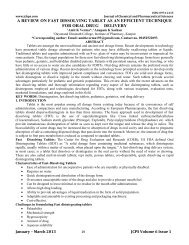Article 5 ISOCRATIC RP-HPLC METHOD VALIDATION OF ... - jchps
Article 5 ISOCRATIC RP-HPLC METHOD VALIDATION OF ... - jchps
Article 5 ISOCRATIC RP-HPLC METHOD VALIDATION OF ... - jchps
Create successful ePaper yourself
Turn your PDF publications into a flip-book with our unique Google optimized e-Paper software.
“The West Coast is a gasoline island. Since there is very little transportation of gasoline betweenthe West Coast and the rest of the United States, it’s not clear you even need to have collusion toinfluence prices here,” he said. “When you do not have enough competition, economists describethat as pivotal suppliers. On the West Coast there are so few players, so it’s not difficult forrefiners to view themselves as pivotal suppliers.”McCullough’s research implies that supply was withheld from the market to keep prices inflated.“The question is not whether there was a fire at Cherry Point. It’s whether everybody else in therefining market also shut down capacity to create a shortage,” Cantwell said in an interview.“We want answers, and my constituents want answers. . . . We think this is an anomaly without agood explanation.”Cantwell, McCullough and industry critic Consumer Watchdog, based in California, questionedthe timing of the cut in production. Apart from the well-documented Cherry Point closure, thelist of production reductions includes: Tesoro’s refinery in Martinez, Calif., repairing ahydrocracker, a high-pressure processing unit, from May 2 to May 13; Shell’s refinery inMartinez undergoing maintenance from April 27 to May 16; Chevron scheduling seasonalmaintenance in Richmond, Calif., on May 28; Alon’s hydrocracker restart in Bakersfield, Calif.,on April 20; and BP’s Carson, Calif., plant undergoing flaring operations from May 15 to May21.Also affecting supply was a fire the ConocoPhillips refinery in Rodeo, Calif., on April 25, and anunspecified and undated production problem at a Tesoro refinery in Anacortes, Wash.“Consumer Watchdog has suspected, with good reason, that refiners, particularly in the WestCoast, use their outages to keep prices high,” said Judy Dugan, director of research for the group,which advocates more regulation of the energy sector. “We have called for at least stateregulation that would oversee refinery outages. They can do anything they want for any reason.”Cantwell in recent years has fought for legislation that limited how much of the oil market can becontrolled by financial speculators and has pressed the Federal Trade Commission to look moreclosely at refiners.In her letter to the FTC, Cantwell said the Cherry Point fire shouldn’t have led to record-lowinventory levels “unless other West Coast refiners failed to undertake actions that could havemade up for the supply shortage resulting from the Cherry Point accident. The reasons why sixother West Coast refiners simultaneously reduced operations are not well documented.”The only operational reduction that appears to have been announced in advance was BP’s flaringoperation at its Carson, Calif., refinery. It had alerted the South Coast Air Quality ManagementDistrict, which monitors air pollution.BP spokesman Scott Dean said Wednesday that the work at the California refinery wasscheduled before the Cherry Point fire and vowed his company would cooperate with any federalprobe.
















